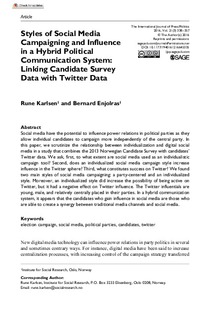| dc.contributor.author | Karlsen, Rune | |
| dc.contributor.author | Enjolras, Bernard | |
| dc.date.accessioned | 2018-09-19T09:01:09Z | |
| dc.date.available | 2018-09-19T09:01:09Z | |
| dc.date.created | 2016-05-04T12:14:27Z | |
| dc.date.issued | 2016 | |
| dc.identifier.citation | The International Journal of Press/Politics. 2016, 21 (3), 338-357. | |
| dc.identifier.issn | 1940-1612 | |
| dc.identifier.uri | http://hdl.handle.net/11250/2563378 | |
| dc.description.abstract | Social media have the potential to influence power relations in political parties as they allow individual candidates to campaign more independently of the central party. In this paper, we scrutinize the relationship between individualization and digital social media in a study that combines the 2013 Norwegian Candidate Survey with candidates’ Twitter data. We ask, first, to what extent are social media used as an individualistic campaign tool? Second, does an individualized social media campaign style increase influence in the Twitter sphere? Third, what constitutes success on Twitter? We found two main styles of social media campaigning: a party-centered and an individualized style. Moreover, an individualized style did increase the possibility of being active on Twitter, but it had a negative effect on Twitter influence. The Twitter influentials are young, male, and relatively centrally placed in their parties. In a hybrid communication system, it appears that the candidates who gain influence in social media are those who are able to create a synergy between traditional media channels and social media. | |
| dc.description.abstract | Styles of Social Media Campaigning and Influence in a Hybrid Political Communication System: Linking Candidate Survey Data with Twitter Data | |
| dc.language.iso | eng | |
| dc.relation.uri | http://hij.sagepub.com/content/21/3/338.full.pdf+html | |
| dc.title | Styles of Social Media Campaigning and Influence in a Hybrid Political Communication System: Linking Candidate Survey Data with Twitter Data | |
| dc.title.alternative | Styles of Social Media Campaigning and Influence in a Hybrid Political Communication System: Linking Candidate Survey Data with Twitter Data | |
| dc.type | Peer reviewed | |
| dc.type | Journal article | |
| dc.description.version | publishedVersion | |
| dc.source.pagenumber | 338-357 | |
| dc.source.volume | 21 | |
| dc.source.journal | The International Journal of Press/Politics | |
| dc.source.issue | 3 | |
| dc.identifier.doi | 10.1177/1940161216645335 | |
| dc.identifier.cristin | 1353943 | |
| cristin.unitcode | 7437,0,0,0 | |
| cristin.unitname | Institutt for samfunnsforskning | |
| cristin.ispublished | true | |
| cristin.fulltext | original | |
| cristin.qualitycode | 2 | |
